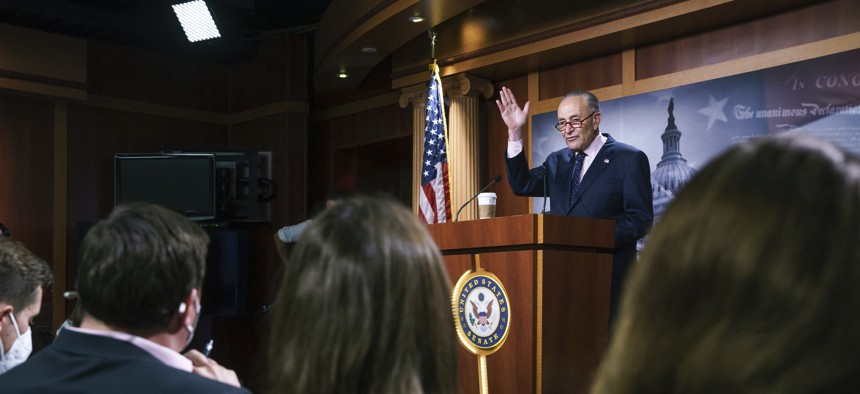Challenges Ahead for $3.5T Budget Bill After Senate Approval

Senate Majority Leader Chuck Schumer, D-N.Y., meets with reporters after a marathon "vote-a-rama" to advance President Joe Biden's federal priorities, at the Capitol in Washington, Wednesday, Aug. 11, 2021. AP Photo/J. Scott Applewhite
Disagreements over the cost of the budget bill among Senate Democrats could slow progress on a separate infrastructure package headed to the House.
Senate Democrats advanced a sweeping $3.5 trillion spending plan in a party-line vote early Wednesday, fresh on the heels of a bipartisan victory on a separate infrastructure plan. But the path forward on both plans could be an arduous one, with the infrastructure bill’s progress in the House potentially tied to the fate of the larger spending plan—which not all Democrats support.
Centrist Democrats and liberals are facing off over the cost of the $3.5 trillion plan to boost spending on social safety net programs.
“There are some in my caucus who believe it’s too much. There are some in my caucus who believe it’s too little. We are all going to come together to get something done,” said Sen. Majority Leader Chuck Schumer, addressing division among Democrats in a press conference Wednesday afternoon. “Every part of Biden’s proposal will be there in a big robust way.”
After a debate that lasted long into the night, the Senate voted 50-49 to advance a measure that instructs committees to begin drafting the $3.5 trillion budget bill. Previously released budget framework broadly outlines anticipated spending on programs including an expansion of Medicare, funding for universal pre-K, and investment climate change initiatives.
The vote comes a day after the Senate’s bipartisan passage of a $1 trillion infrastructure bill. The bill, which garnered support from 19 Republicans, now needs approval in the House. But progressives in the House have said they would withhold support of the infrastructure bill until the Senate finishes its work on the larger spending plan. House Speaker Nancy Pelosi has repeatedly said she does not intend to take up the bipartisan infrastructure bill until the Senate passes the other spending bill.
Debate Over Cost
The Senate will need every Democrat to support the spending bill if it is to pass, but Democrats disagree over the cost of the plan. Progressives are pushing for more funding to support families and combat climate change in the spending bill, while centrists say the price tag is already too large given the amount of money spent in response to the coronavirus pandemic.
“I have serious concerns about the grave consequences facing West Virginians and every American family if Congress decides to spend another $3.5 trillion,” said Sen. Joe Manchin, a West Virginia Democrat who has signaled he will not support the spending package. “I firmly believe that continuing to spend at irresponsible levels puts at risk our nation’s ability to respond to the unforeseen crisis our country could face.”
President Biden touted the plan Wednesday, saying it would lower out-of-pocket costs for prescription drugs, provide subsidies to cover the cost of child care, and pay for two years of community college.
“We need to make this economy work better for families in the long run,” Biden said during a press conference. “If your primary concern right now is the cost of living you should support his plan, not oppose it. A vote against this plan is a vote against lowering the cost of heathcare, housing, childcare, eldercare and prescription drugs for American families.”
Andrea Noble is a staff correspondent with Route Fifty.
NEXT STORY: Governments Doling Out Bonuses for Public Employees, 'Gratitude Grants' for Grocery Workers





